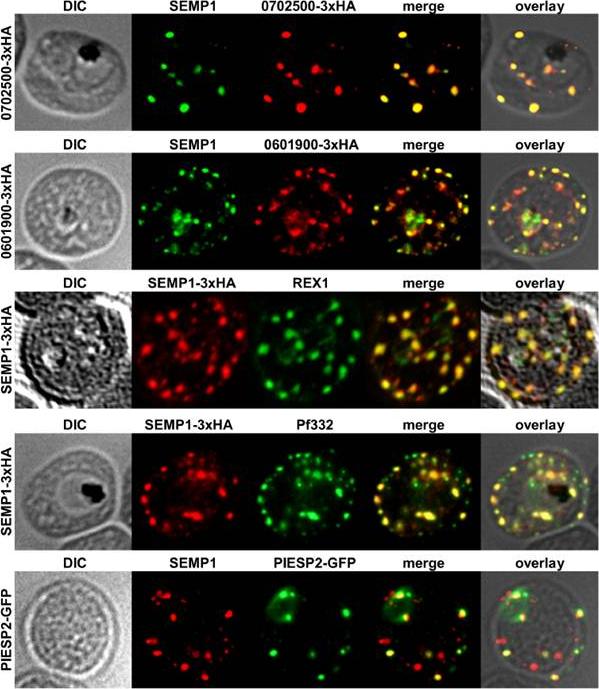PF3D7_0702500 Plasmodium exported protein, unknown function
Disruptability [+]
| Species | Disruptability | Reference | Submitter |
|---|---|---|---|
| P. falciparum 3D7 |
Possible |
USF piggyBac screen (Insert. mut.) | USF PiggyBac Screen |
Mutant phenotypes [+]
None reported yet. Please press the '+' button above to add one.Imaging data (from Malaria Metabolic Pathways)

Fluorescence pattern of exported GFP fusion proteins with no PEXEL sequence. PF07_0007 conserved; PF07_0008 exported protein; PF07_0003 rifin; PF11_0505 unkown function; PF13_0194 MSP7-like protein MSRP7; PF14_0045 conserved. For PF08_0003-GFP two panels. showing a trophozoite stage (troph) and a ring stage (ring) parasite are shown to demonstrate the different localisations in these stages. For PF14_0045-GFP two panels are shown to demonstrate cells with (yellow arrows) and without additional foci of fluorescence in the host. Nuclei were stained with DAPI. Size bars: 5 mm. Heiber A, Kruse F, Pick C, Grüring C, Flemming S, Oberli A, Schoeler H, Retzlaff S, Mesén-Ramírez P, Hiss JA, Kadekoppala M, Hecht L, Holder AA, Gilberger TW, Spielmann T. Identification of New PNEPs Indicates a Substantial Non-PEXEL Exportome and Underpins Common Features in Plasmodium falciparum Protein Export. PLoS Pathog. 2013 9(8):e1003546.
See original on MMP
PfHsp110c prevents the aggregation of Asn-rich protein during febrile episodes. Live fluorescence images of PfHsp110c–RFA parasite lines expressing (a,b) the Asn repeat-rich parasite protein, PFI1155w. incubated at 400C for 6 h with (a) or without (b) 10mM TMP. The arrowheads indicate fluorescent foci of PFI1155w–tagRFP-T (b). Scale bar represents 2 mm. Images from left to right are phase, DAPI, GFP (MAL13P1.540), RFP (PFI1155w) and GFP–RFP merge. Parasites that were subjected to heat shock without TMP showed foci of PFI1155w–tagRFP-T (b) and indicative of protein. The distribution of PfHsp110c–RFA also was more focal upon heat shock in the absence of TMP (b) in the absence of TMP is specifically owing to the loss of PfHsp110c function.Muralidharan V, Oksman A, Pal P, Lindquist S, Goldberg DE. Plasmodium falciparum heat shock protein 110 stabilizes the asparagine repeat-rich parasite proteome during malarial fevers. Nat Commun. 2012 Dec 18;3:1310.
See original on MMP
Localization of potential SEMP1 interacting proteins. Immunofluorescence assays of MeOH-fixed RBCs infected with 3D7 expressing EMP1/PF3D7_0702500 (PF07_0008)/PF3D7_0601900 (PFF0090w) with a C-terminal 3xHA tag and 3D7 expressing PIESP2 with a C-terminal GFP-tag, co-labelled with mouse a-SEMP1 and rat a-HA (PF3D7_0702500-3xHA & PF3D7_0601900-3xHA) /a-GFP (PIESP2-GFP). For co-labelling of SEMP1-3xHA with REX1 and Pf332, rat a-HA and rabbit a-REX1 / mouse a-Pf332 antibodies were used. All potential interaction partners co-localized at least partially with SEMP1, but in particular with Pf332 or PIESP2 antibodies only a fraction of SEMP1 positive MCs were labelled with either antibody suggesting that distinct subpopulations of MCs exist. Dietz O, Rusch S, Brand F, Mundwiler-Pachlatko E, Gaida A, Voss T, Beck HP. Characterization of the Small Exported Plasmodium falciparum Membrane Protein SEMP1. PLoS One. 2014 9(7):e103272.
See original on MMPMore information
| PlasmoDB | PF3D7_0702500 |
| GeneDB | PF3D7_0702500 |
| Malaria Metabolic Pathways | Localisation images Pathways mapped to |
| Previous ID(s) | PF07_0008 |
| Orthologs | |
| Google Scholar | Search for all mentions of this gene |